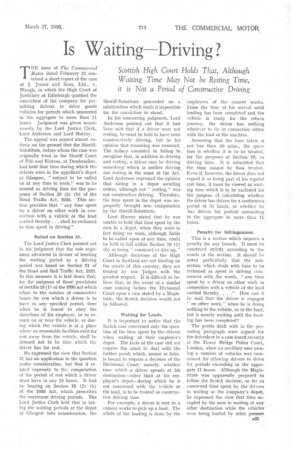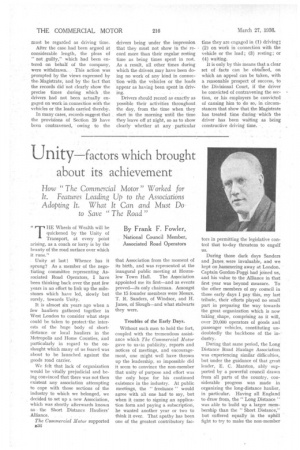Is Waiting Driving?
Page 49

Page 50

If you've noticed an error in this article please click here to report it so we can fix it.
THE issue of The Commercial Motor dated February 21 contained a short report of the case of J. Jesner and Sons, Ltd., v. Waugh, in which the High Court of Justiciary at Edinburgh quashed the conviction of the company for permitting drivers to drive goods vehicles for periods which amounted in the aggregate to more than 11 hours. Judgment was given unanimously by the Lord Justice Clerk, Lord Anderson and Lord Murray.
The appeal was argued almost entirely on the ground that the SheriffSubstitute, before whom the case was originally tried in the Sheriff Court of Fife and Kinross, at Dunfermline, had held that time during which the drivers were in the appellant's depot at Glasgow, "subject to be called on at any time to work," was to be treated as driving time for the purposes of Section 19 (2) (b) of the Road Traffic Act, 1930. This section provides that "any time spent by a driver on other work in connection with a yehicle or the load carried thereby. . . shall be reckoned as time spent in driving," Relied on Section 31.
The Lord Justice Clerk pointed out in his judgment that the sole argument advanced in favour of treating the waiting period as a driving period was based on Section 31 of the Road and Rail Traffic Act, 1933. In this measure it is laid down that, for the purposes of those provisions of Seetibn19 (1) of the 1930 Act which relate to the number of consecutive hours for rest which a driver is to have in any specified period, time when he is bound to obey the directions of his employer, or to remain on or near the vehicle, or during which the vehicle is at a place where no reasonable facilities exist for rest away from the vehicle, shall be deemed not to be time which the driver has for rest.
He expressed the view that Section 31 has no application to the question under consideration, but that it related expressly to the computation of the period of rest which a driver must have in any 24 hours. It had no bearing on Section 19 (2) (b) of the 1930 Act, which prescribes the maximum driving periods. The Lord Justice Clerk held that in taking the waiting periods at the depot at Glasgow into consideration, the Sheriff-Substitute proceeded on a misdirection which made it impossible for the conviction to stand.
In his concurring judgment, Lord Anderson pointed out that it had been said that if a driver were not resting, he must be held to have been constructively driving, but in his opinion that reasoning was unsound. The fallacy consisted in failing to recognize that, in addition to driving and resting, a driver may he driving something which is neither driving nor resting in the sense of the Act. Lord Anderson expressed the opinion that sitting in a depot aWaiting orders, although not "resting," was not constructive driving. Therefore, the time spent in the depot was improperly brought into computation by the Sheriff-Substitute.
Lord Murray stated that he was unable to hold that time spent by the men in a depot, when they were in fact doing no work, although liable to be called upon at any time, could be held to fall within Section 19 (2) (b) as being " construct; ve driving."
Although decisions of the High Court in Scotland are not binding on the courts of this country, they are treated by our Judges with the greatest respect. It is difficult to believe that, in the event of a similar case coming before the Divisional Court upon a case stated by a Magistrate, the Scotch decision would not be 'followed.
Waiting for Loads.
It is important to notice that the Scotch case concerned only the question of the time spent by the drivers when waiting at their employer's depot. The facts of the case did not require the court to deal with the further point; which, sooner or later, is bound to require a decision of the Divisional Court, namely, whether time which a driver spends at his destination—other than at his ernplover's depot—during which he is not concerned with the vehicle or the load, is to be treated as constructive driving time.
For example, a driver is sent to a cement works to pick up a load. The whole of the loading is done by the employees of the cement works. From the time of his arrival until loading has been completed and the vehicle is ready for • the return journey, the driver has nothing whatever to do in connection either with the load or the machine.
Assuming that the time taken is not less than BO mins., the question is whether it is to be treated, for the purposes of Section 19, as driving time. It is submitted that the time cannot be thus treated. Even if, however, the driver does not regard it as being part of his regular rest time, it must be viewed as waiting time which is to be excluded for the purpose of calculating whether the driver has driven for a-continuous period of 54 hours, or whether he has driven for periods amounting. in the aggregate to more than It hours.
Penalty for Infringement.
This is a section which imposes a penalty for any breach. It must be construed strictly according to the words of the section. It should be noted particularly that the subsection which deals with time to be reckoned as spent in driving cornm-ences with the words, "any time spent by a driver on other work in connection with a vehicle or the toad carried thereby. . . ." How can it be said that the driver is engaged "on other work," when he is doing nothing to the vehicle, or to the load, but is merely waiting until the loading. has been completed'?
The points dealt with in the preceding paragraph were argued for the defendant in a case heard recently at the Tower Bridge Police Court, London, when an ancillary user owning A number of vehicles was summoned for allowing drivers to drive for periods exceeding in the aggregate 11 hours. Although the Magisstrate was apparently prepared to follow the Scotch decision, so far as concerned time spent by the drivers in waiting at the company's depot, he expressed the view that time occupied by the men in waiting at any other destination while the vehicles were being loaded by other persons
must be regarded as driving time.
After the case had been argued at considerable length, the pleas of "not guilty," which had been entered on behalf of the company, were withdrawn. , This action was prompted by the views expressed by the.Magistrate; and by the fact that the records did not clearly show the precise times during which . the drivers had not been actually engaged on work in connection with the vehicles or the loads carried thereby.
In many cases, records suggest that the provisions of Section 19 have been contravened, • owing to the drivers being under the impression that they must not show in the record more than their regular resting time as being times spent in rest. As a result, all other times during which the drivers may have been doing no work of any kind in connection 'with -the vehicles or the loads appear as having been spent in driving.
Drivers should record as exactly as possible their activities throughout the day, from the time when they start in the morning until the time they leave off at night, so as to show clearly whether at any particular
time they are engaged in (I) driving; (2) on work in connection with the vehicle or the load ; (3) resting ; or (4) waiting.
It is only by this means that a clear set of facts can be obtained, on which an appeal can be taken, with a reasonable prospect of success, to the Divisional Court, if the driver be convicted of contravening the section, or his employers be convicted of causing him to do so, in circumstances that show that the Magistrate has treated time during which the driver has been waiting as being constructive driving time.




























































































